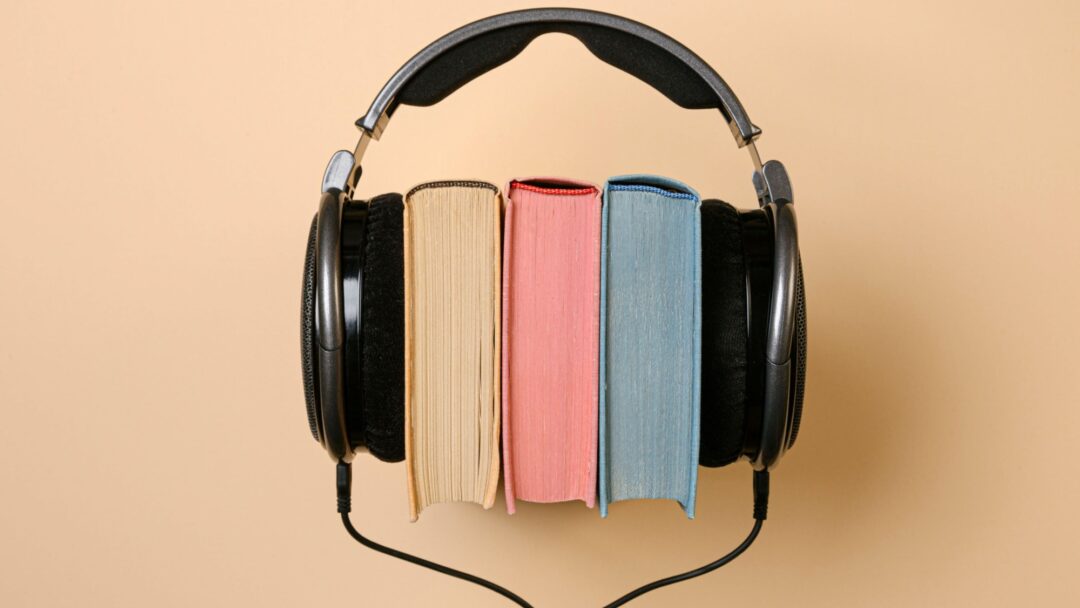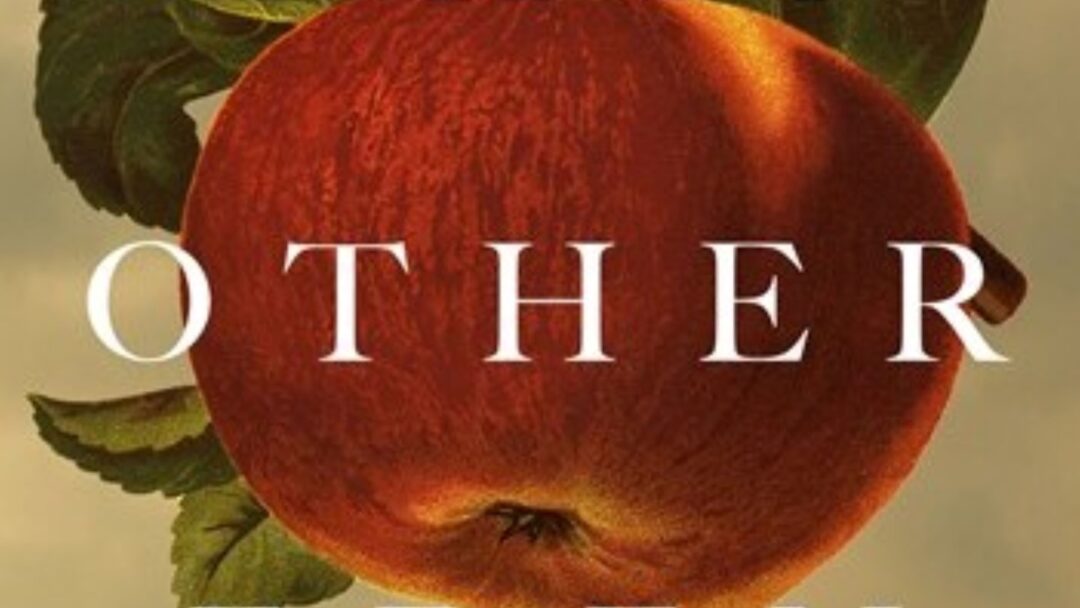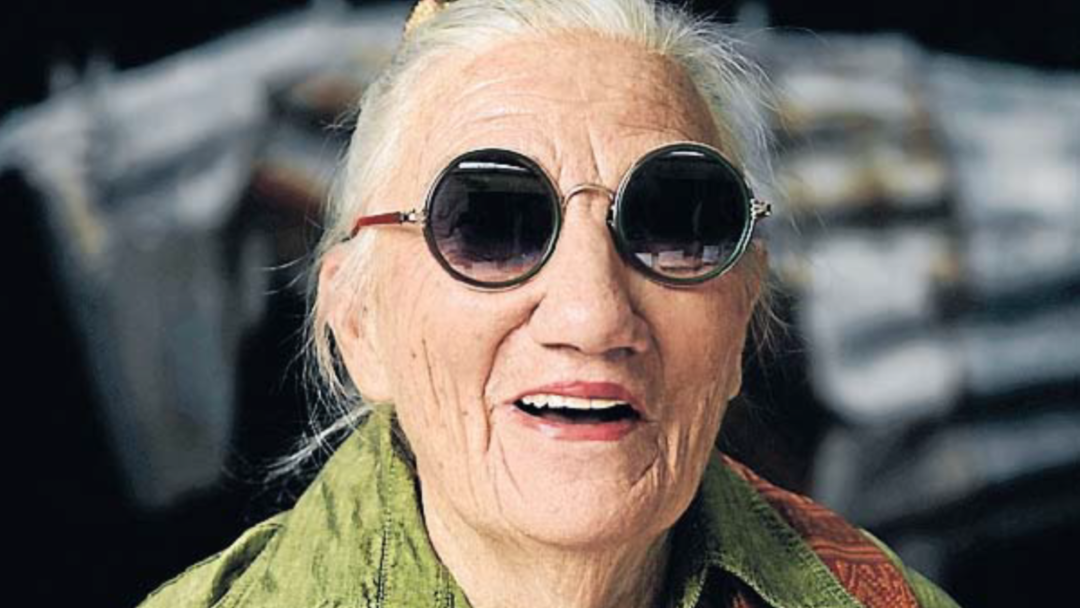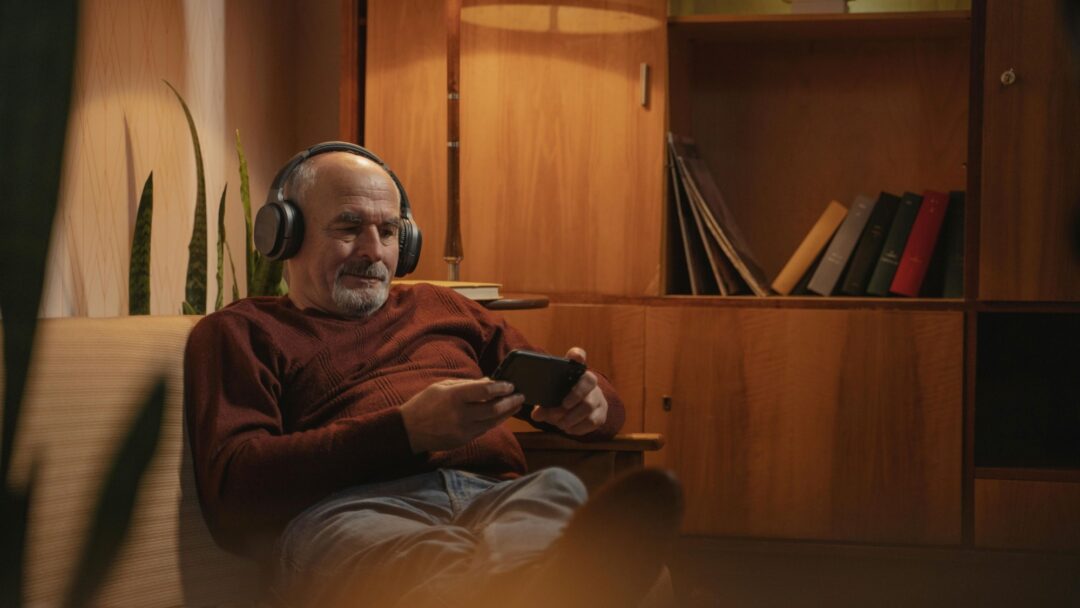Audio
Family histories
Hear This by
Vision Australia3 seasons
11/8/2023
27 mins
Books from the Vision Australia library - this episode featuring memoirs and family histories.

Hear This reviews latest books from the Vision Australia library for people who are blind or have low vision. Presented by Frances Keyland.
To mark Family History Month, this edition looks at memoirs and family histories.
00:11S1
You. Hello and welcome to hear this. I'm Francis Kelland and you're listening to the Vision Australia Library Radio Program talking about books in the Vision Australia Library collection. Today we're focusing on memoir and we have Leon Society. First up, talking about some exciting events happening in the library. We were here today with Leon CJD once again catching up with what's happening in the library. Hello, Leanne.
00:54S2
Hello, Francis. How are you?
00:55S1
I'm well, thanks. Nice to have you on the show again. So, yeah. What's coming up with the library?
01:01S2
Yeah, So we've got a busy couple of months ahead, actually, so it's great to be on to let your listeners know about some of the programs that are happening in the library. We know our writing programs are always really, really popular with our members. So we've got some great series coming up later this month, starting on the 22nd of August. We're beginning our writing family history series, and that's a three part series running on Friday mornings with Jonathan Butler, who is the author of The Boy in the Dress, which is a memoir about his ancestors. And yeah, so we will be looking at writing family history, how to research your family history and recreate the world of your family.
01:51S1
That sounds fantastic because I'm. Yeah, everyone's interested in where they come from.
01:56S2
Yes, absolutely. Yeah. And it is National Family History Month, so it is nice to kind of offer this at this time when people might be thinking about how to research and tell their family story. We know a lot of the people that come through to do our memoir writing courses actually have much bigger stories to tell. So hopefully this gives people an introduction into how to tell some of those stories.
02:20S1
Yes, and a bit of a rabbit hole for some, because once you start digging, sometimes it's really hard to stop. So a rich, wonderful course there for people.
02:30S2
Yeah. So registrations are now open. You can find the details on the library website.
02:36S1
Okay. And what else you mentioned? There's a few things.
02:40S2
Yeah. So we I mentioned the memoir writing course that is coming back in September. And I did want to give your listeners lots of notice because we do tend to book that one out pretty quickly. So that's starting on the 15th of September. That'll be on Friday mornings. And yeah, it's a great six week series that's put together with Writers Victoria and we have a range of authors who are joining us looking at the art of memoir writing. So narrative, character, voice and the ethics of memoir writing, which is a really, really interesting topic to think about. Yeah. So that's a fantastic series that we know has been really, really well received in the past. I think this is the fifth time we might be running it. So yeah, if you haven't had a chance to join previously, you've got another opportunity.
03:35S1
That sounds good. Do you have any idea of what writers will be involved in the September course?
03:42S2
Yeah, absolutely. So we have joining us for this series Lyndal Caffrey, who might be well known to some of your members, the fabulous Prior, who of course just finished a Writing for Wellbeing series with us. So she's become a real friend of the Vision Australia Library and it's great to be having her back. Some of the other authors joining us are Rose Bellamy, Never Susan and Lee Coffman as well.
04:07S1
They're so active in supporting writers.
04:10S2
They're fabulous mentors. And we have worked with all of these writers to also ensure that the sessions we provide are really accessible for our members. And I think that's something really special about the courses that we offer, is that they are, yeah, really, really accessible, really inclusive. Everyone's able to participate. Many of our members kind of have a shared experience as well, which often comes across in the courses and that's really special.
04:36S1
Yeah, yeah. What else is coming up?
04:39S2
And for the readers, we have our ongoing treat Yourself. So our next one is on the 1st of September ever on a Friday evening. If you want to kick off your weekend chatting about books, you're very welcome to join us to treat yourself. This time we'll be chatting about biographies and memoir, which is one of my favorite genres, and I know a lot of our members enjoy it as well, so it would be great to have some some more suggestions, more things to add to the to be read files.
05:10S1
Oh, yes, wonderful. I was looking today at some memoirs to put on the show this week, so this is all very pertinent. Excellent.
05:18S2
Yeah, yeah, yeah. And just one other thing I do want to mention, Frances. We've recently wrapped up a Biblio therapy series with the wonderful Dr. Susan McLean. So Biblio therapy is a practice of using literature to promote wellbeing, and Dr. Susan has produced a series of podcasts for the. In Australia libraries exclusively produced for us and they are now available on the library as well. So if you're interested in checking out Biblio therapy, have a look for the Wellbeing Through Stories podcast. You can find it listed as a periodical in the Access catalogue. Subscribe to it and look up the back issues for a listen. We've got three episodes for adults, three for young adults and three for children. So that's a really, really interesting kind of reading resource that I would recommend at your listeners to try out.
06:23S1
That's a wonderful idea. Biblio Therapy And who was the person that did the podcasts for the library?
06:30S2
They Dr. Stefan McLean, who is an international leader in the practice of Biblio therapy. So she's really kind of pioneered and is, I guess, working to kind of mainstream Biblio therapy as a complementary therapy to promote well-being. Yeah.
06:50S1
Elizabeth, great idea. Thanks for that. And what about yourself? What have you been reading?
06:56S2
So I have just started a memoir, Preparing for a Treat for our next Treat Yourself. I'm reading The Shape of Sound by Fiona Murphy, which has been recommended to me a few times during the memoir writing course, so I thought I would check it out. It's brilliantly written. She's an exquisite writer and Fiona was born deaf, and the book is about her reckoning with her identity as a deaf woman. You know, in a time where deaf culture perhaps wasn't always embraced kind of in in mainstream Australian kind of society. So it's a really fascinating read, a wonderful exploration of sound and how we experience the world. Fiona is a magnificent writer, so I'm really enjoying this one and it is available in the library as well.
07:52S1
And anything else you're reading? Well, that sounds fairly engrossing anyway.
07:56S2
Yeah, yeah. No, that's about that's about it at the moment.
08:01S1
All right. I'm sure you've got a to be read pile, but yeah.
08:05S2
Oh actually I have have just started the audio for Matthew McConaughey, his memoir as well. That's Greenlights and that's available in the library. That's been a lot of fun. It's a he narrates it himself so we get a lot of a lot of speed in his narration. It's a very interesting kind of rambly poetic take on memoir.
08:33S1
Um, yeah. He's become a bit of a mentor for people through this memoir, but also, you know, just his general attitude to life, which is, yeah, fairly embracing.
08:46S2
Yes. Yeah, yeah. It's quite, it's quite an uplifting kind of read. Yeah. It's all about taking, you know, the opportunities that life throws at you and looking, looking for the green light to go ahead. So yeah, it's a fun one to listen to. It's quite a unique listen.
09:02S1
Well, thanks, Liane, for coming on today again and a very memoir rich episode. This will be I'll find some wonderful memoirs, including I'll put a sample of Shane Pryor's memoir, Shy on here on this show. And and thank you very much for your time today.
09:22S2
Excellent.
09:23S1
That was Leanne, CJD Community Engagement Coordinator here at Vision Australia Library. So let's start off with Shan Pryor's memoir, Shy Shan Pryor has maintained a career in the public eye as a broadcaster and performer for more than 20 years. For far longer than that, she has suffered from excruciating shyness. Eventually, after bolting from a party in a state of near panic, she decides to investigate her condition. What is it? Shyness? Where did hers come from? Why does it create such distressing turmoil? Beneath her assured professional front, Shai a memoir Frank, provocative, remarkable in its clarity and beautifully written, is a book about unease about questioning who you are and evading the answer. It is about grief and abandonment and loss. It is about how the simple word shy belies the complex reality of what that really means. Let's hear a sample of Shy by Shan Pryor. It's narrated by Veer Lambrew.
10:26S3
It began with me standing outside of me, watching as I stood silently on the fringe of a group of strangers. A familiar sensation was seeping through my body. It was as if someone had spiked my drink so that instead of sparkling mineral water, I was now sipping a kind of effervescent cement. My limbs were growing rigid, and my smile was the tight rictus you see on the faces of young ballet dancers. The birthday girl was busy talking to other people and I couldn't see anyone else I recognized. My partner Tom was there somewhere in that art gallery full of strangers. Tom's football team had triumphed, and he had celebrated with a couple of whiskeys. Between leaving the ground and meeting me at the party. Now, I couldn't find him in the crowd. Sweat was trickling down the insides of my arms under a green jumper that felt too tight and no doubt looked too bright. My stomach was churning and my fingers gripped the glass so hard they were beginning to ache. And now I was watching myself sidling towards the door. The car needs to be moved. A one hour park won't be enough. There must be a better one somewhere close by. Or far away at home.
11:40S1
Perhaps that's shy by Shane Prior. That book goes for six hours and 50 minutes. Shan is spelt Seon Seon Prior is p r i o. R. Shan is one of the contributing mentors to memoir writing that will be starting on the 15th of September. It's a six week course in conjunction with Writers Victoria and this is the fifth time this has been running. And a big thank you to Shan for all of her input into Vision Australia Library clients. The next book is The Rag and Bone Shop. This is by Veronica O Keene. Veronica is a leading psychiatrist and she shows how the mysteries of the brain are illuminated and at the extremes of human experience, a twinge of sadness, a rush of love and not of loss, a whiff of regret. Memories have the power to move us often when we least expect it. A sign of the complex neural processes that continues in the background of our everyday lives. A process that shapes us, filtering the world around us, informing our behavior and feeding our imagination. Veronica Keene has spent many years observing how memory and experience are interwoven, and in this rich, fascinating exploration, she asks, among other things, Why can memories feel so real? How are our sensations and perceptions connected with them? Why is place so important in memory? Let's hear a sample now of the Rag and Bone Shop by Veronica O Keene. It's narrated by Kate Locke. In the.
13:17S2
Rest of this.
13:18S4
Chapter, we will look at how we interpret the world through our senses and how sensation is the thread that feeds the loom of understanding and memory. The fundamental point that we cannot make memories without sensation may be so familiar to us that we are blind to it. It is difficult to believe that it took many hundreds of years to understand the now self-evident fact that the five senses bring information to the brain so that one can learn and categorize information and ultimately form a coherent sense of the world. The story of the relationship of sensation to memory dates back to the beginnings of the scientific revolution 4 to 5 centuries ago. The shift in the understanding of memory from being a static repository of knowledge to being a dynamic living human experience is a profound one and was highly contested. This shift started in the 16th and 17th centuries At the time of the beginnings of modern scientific thinking.
14:34S1
That was the Rag and Bone Shop by Veronica o Keene. Veronica is v e. R o n eka v e. Veronica o Keen is o apostrophe k e. A n e. K e. A n e. And that book goes for 11 hours now to a memoir by James Tait Hill. This is called Blind Man's Bluff. At age 16, James Tate Hill was diagnosed with Libra's hereditary optic neuropathy, a condition that left him legally blind. After high school, friends stopped calling and a disability counsellor advised him to aim for CS in his classes. He used his remaining blurry peripheral vision to pretend he could still see feigning eye contact, memorizing common routes, filling shelves with paperbacks he read via tape cassettes. He organized his life around passing for sighted for 15 years. Hill hid his blindness from friends, colleagues and lovers, even convincing himself that if he stared long enough, things would come into focus. Let's hear a sample of Blind Man's Bluff by James Tait Hill. It's narrated by Curtis Armstrong.
15:48S5
The first hints are the half erased words on the overhead projector. Most of your teachers recycle lesson plans, but from your seat in the last row of a high school lecture hall, Mrs. Jones's smudged transparencies seem aggressively lazy. You study the notebook of the guy beside you who also squints at the screen. His notes could be charitably described as judicious, but they contain a number of lines you couldn't piece together. You tell your mom you need glasses. She makes you an appointment with Dr. Keene, the optometrist who bears a striking resemblance to Chicago Bulls coach Phil Jackson. Is dead. God asks an Entertainment Weekly cover in his waiting room. The question floating beside the disembodied head of Jerry Garcia. You turn pages nonchalant about the prospect of reinventing your look. If you're being honest, the no glasses look hasn't gotten you very far. Dr. Keene sees right away what's wrong when he covers your right eye. The eye chart disappears.
17:05S1
Blind Man's Bluff. That was a sample of by James Tait Hill. James JMS. It's not a hyphenated surname, but it is two words. Tait tatty tatty hill h i l. L h i double l. And that book goes for 7.5 hours. The next book is another American memoir. It's called Darling Days, and it's by IO Tillet Wright, Born into the beautiful Bedlam of downtown New York in the 80s. IO Tillet Wright came of age at the intersection of punk, poverty, heroin and art. This was a world of self invented characters, glamorous superstars and strung out sufferers, ground zero of drag and performance art. Still, no personality was more vibrant and formidable than Io's Mother Rhona, a showgirl and young widow, was a mercurial, erratic glamazon. She was Io's fiercest defender and only authority. In a world with few boundaries and even fewer indicators of normal life. At the center of darling days is the remarkable relationship between a fiery kid and a domineering ma. A bond defined by freedom and control, excess and sacrifice by heartbreaking deprivation, agonizing rupture, and ultimately, forgiveness. Darling Days is also a provocative examination of culture and identity, of the instincts that shape us and the norms that deform us, and of the courage and resilience it takes to listen closely to your deepest self. When a group of boys refused to let six year old female born IO play ball, IO instantly adopts a new persona becoming a boy named Ricky, a choice Io's parents support and celebrate. It is the start of a profound exploration of gender and identity through the tenderest years and the beginning of a life invented and reinvented at every step. Let's hear a sample of Darling Days by IO Tillet Wright. It's narrated by the author IO Tillet Wright.
19:10S6
From where I am, I can see the streets steaming. Nearly naked. Bodies all around me are glistening with sweat and glitter, writhing to blaring samba music. I met the front corner of a float moving down Avenue C in the annual Brazilian Day Festival, which is a roaring parade of referee whistles, cowbells and thunderous beats. As far as I can see, there are women in thongs and headdresses, shirtless men in tiny shorts, and every variation of yellow and green, the colour of Brazil's national flag. The sun crackles down on hundreds of smiling faces, including my friends little Sean and Badoo, who are hanging off the float with me. Everyone is dancing or singing or playing an instrument sweating and dehydrated. Several people have climbed onto the back of our float and exhaustion and passed out. My friends and our chariot are enclosed in a sea of samba school students dressed in all white, hitting giant drums in unison that hang from their waists.
20:13S1
And that was a sample of darling days. And just a bit of a warning with that one. It does contain high levels of what could be considered offensive language to to people. IO is spelt IO. It's simply io till it right again. Two words is t i l l e t t i l l e t t right is wri t wri t 11 hours. That book goes for now. Heading home to Australia. We have Bohemian negligence. This is a memoir by Bertie Blackman. If you could touch your memories, how would they feel? My first memory of life is blurry, a blurry red dot, a strawberry in a thicket of dark green vines and tall grass, a chalky red pastel, a cadmium paint splash, a cardinal's feather, a lipstick smear, a strawberry kiss, all things red In one Bohemian negligence tells the story with breathtaking innocence of a child's point of view, close and vivid and utterly in the moment. As memories refract and allied with the images, sounds and impressions of Bertie's child's world. A renowned musician and artist, Bertie is also a formidable and lyrical writer As the daughter of iconic artist Charles Blackman, that world celebrated freedom and creativity but also contained darkness and contradictions. Bertie has captured the magic and vulnerability of childhood in words and images, both joyful and haunting. Let's hear a sample of Bohemian negligence by Bertie Blackman. It's narrated by Bertie Blackman.
21:55S7
I look out the oval window of the aeroplane. My stomach turns as the wind dips down and I marvel at the twinkling sunlight dancing across the ocean. My brother twitches in the seat next to me and complains because he wanted to sit next to the window to watch the landing gear to go down. Too bad, I say smugly. Dad has been living in Cairns off and on all year. He's been painting for a new exhibition there and we are flying north by ourselves to see him for the summer holidays. My new little brother, Axiom is going to be christened while we're there and the whole family is coming. My sister Christabel is even travelling from Spain. Dad is waiting at the airport wearing pink shorts and a Hawaiian shirt. He opened his arms wide. When he sees us. I hug him tight. Hello, Beats, he says happily. And to my brother. Hello. Flip flops. He picks up our bags and leads us towards the taxi rank. Victoria is with the rest of the family back at the hotel. We're staying at the Ramada Resort. It has the best pink lemonades in town. You can swim up to the bar and order whatever you want.
23:03S1
That was Bohemian negligence by Bertie Blackman. R Bertie is b e r t i. E. B e. R t i. E. Blackman is black man, black man. And that book goes for 3.5 hours. The next book is Ten Doors Down by Robert Tickner. Robert Tickner had always known he was adopted, but had rarely felt much curiosity about his origins serving in the Hawke and Keating governments, He held the portfolio of Minister for Aboriginal and Torres Strait Islander Affairs and while there he was instrumental in instigating the national inquiry into the Stolen Generations. When in his 40s, Robert at last turned his attention to the question of his own birth. He had some sense of the potentially life changing course that lay ahead of him, but he could not have anticipated learning of the exceptional nature of the woman who had brought him into the world, the deep scars that his forced adoption had left on her, or the astonishing series of coincidences that had already linked their lives. And this was only the first half of a story that was to lead to a reunion with his birth father and siblings. Let's hear a sample of Ten Doors Down by Robert Tickner. It's narrated by Robert Tickner.
24:20S8
My mother made her and Beazley was 23 years old at the time of my birth and not married. She had grown up in the New South Wales central west town of Orange and had come to Sydney for my birth. As did almost all single women who became pregnant in those times. She suffered family and social pressures to leave her work, her town and her friends. She carried the shame of her pregnancy to the city of Sydney, where she secretly gave birth to her child. After my mother had signed the papers to give the child up for adoption, she was told nothing at all about where her baby had gone, the signing completed. That was the end of the matter. The law had spoken. The prevailing thinking at the time was that an adopted baby should be given a fresh beginning, free of the stigma of illegitimacy.
25:26S1
That was ten Doors down by Robert Tickner. Robert is Robert Tickner is t i c. K n e. R t i n e r. And that book goes for eight hours. Thank you for joining us on here this today. I'm Frances Kelland. Thank you to Leanne, CJD Community engagement coordinator here at Vision Australia Library. If you would like to offer your own ideas about what makes a great memoir or just send through the titles of memoirs that you've enjoyed, please do. The library's phone number is 1300 654 656 1300 654 656. Or you can email library at Vision Australia. Org. That's library at Vision Australia. Org. I hope you have a lovely week and we'll be back next week with more here this.
Continue listening

On Hear This, latest books in the Vision Australia library. This edition, award-winning Oz fiction.
Australian fiction
Hear This by Vision Australia
4/8/2023
•28 mins
Audio

Books from the Vision Australia library - this episode featuring memoirs and family histories.
Family histories
Hear This by Vision Australia
11/8/2023
•27 mins
Audio

This edition: Michael Parkinson remembered and an assortment of latest books from the Vision Australia library.
Vale Michael Parkinson
Hear This by Vision Australia
18/8/2023
•26 mins
Audio

Hear This reviews latest books from Vision Australia library - this edition starting with two Booker Prize aspirants.
Booker Prize hopefuls
Hear This by Vision Australia
25/8/2023
•27 mins
Audio

Hear This interviews Tracey Chevalier, author of Girl with a Pearl Earring.
Girl with a Pearl Earring
Hear This by Vision Australia
8/9/2023
•28 mins
Audio

Hear This samples a variety of audio books from the Vision Australia library.
Top picks from audio books
Hear This by Vision Australia
15/9/2023
•28 mins
Audio

Events and activities at Vision Australia library - and latest picks from its books.
Community engagement
Hear This by Vision Australia
22/9/2023
•27 mins
Audio

This edition of Hear This from the Vision Australia library opens with a discussion of banned books.
Banned books
Hear This by Vision Australia
6/10/2023
•28 mins
Audio

Hear This features latest books and events at the Vision Australia library.
Latest events and books
Hear This by Vision Australia
13/10/2023
•27 mins
Audio

Latest books from the Vision Australia library - including childhood tales and a John Grisham thriller.
Childhood tales and a Grisham thriller
Hear This by Vision Australia
20/10/2023
•28 mins
Audio

Latest books from the Vision Australia library - including a novel by Australian Sam Drummond.
Oz writer Sam Drummond
Hear This by Vision Australia
3/11/2023
•27 mins
Audio

Books from the Vision Australia library - including a memoir by a friend of Anne Frank.
Anne Frank's friend
Hear This by Vision Australia
10/11/2023
•28 mins
Audio

Book reviews and excerpts from Vision Australia library - including a wartime struggle for survival.
Survival in wartime
Hear This by Vision Australia
24 November 2023
•27 mins
Audio

A special seasonal edition reviews Christmas murder stories available from Vision Australia library.
Yuletide Homicide
Hear This by Vision Australia
8 December 2023
•28 mins
Audio

Veteran talking book reader Tony Porter reviews his many voices.
The many voices of Tony Porter
Hear This by Vision Australia
5 January 2024
•27 mins
Audio

What's new in Vision Australia library of Braille and audio books - including new Australian works.
New Australian books
Hear This by Vision Australia
12 January 2024
•28 mins
Audio

Vision Australia librarian talks of coming events and latest books for people with blindness and low vision.
Coming events and new books
Hear This by Vision Australia
26 January 2024
•28 mins
Audio

Review of books from the Vision Australia library - from a broad international range.
Books from Japan, US, Australia and Sweden
Hear This by Vision Australia
2 February 2024
•27 mins
Audio

New books in the Vision Australia library - from E.L.Doctorow to Alan Bennett.
Reasons Not to Worry, Wild Things... and Alan Bennett
Hear This by Vision Australia
9 February 2024
•28 mins
Audio

Latest events and books from Vision Australia Library, featuring its Community Engagement Co-ordinator.
Vision Library latest with Leeanne
Hear This by Vision Australia
16 February 2024
•28 mins
Audio

Features Jamie Kelly of Vision Australia Library, updating us on its website catalogue. And other new books.
Vision Australia library online, and Jelena Dokic
Hear This by Vision Australia
23 February 2024
•29 mins
Audio

New books in the Vision Australia Library - in this edition, books about paintings.
Books about paintings
Hear This by Vision Australia
1 March 2024
•26 mins
Audio

From the Vision Australia Library, women's memoirs on International Women's Day.
Women's memoirs on IWD
Hear This by Vision Australia
8 March 2024
•28 mins
Audio

Coming events and books at Vision Australia Library for people with blindness or low vision.
Coming events at Vision Library - and a Kerouac classic
Hear This by Vision Australia
15 March 2024
•29 mins
Audio

Latest books from Vision Australia Library - this week, some top Oz and worldwide novels.
Top Oz and world novels
Hear This by Vision Australia
29 March 2024
Audio

Coming events at Vision Australia Library in connection with the Melbourne Writers' Festival.
Melbourne Writers' Festival
Hear This by Vision Australia
5 April 2024
•28 mins
Audio

Coming events and new books at the Vision Australia Library for blind and low vision people.
Event update and more new books
Hear This by Vision Australia
12 April 2024
•29 mins
Audio

How printed works are brought to life as audio books in the Vision Australia Library.
Audio book narrators
Hear This by Vision Australia
19 April 2024
•28 mins
Audio

ANZAC Day edition of this series from the Vision Australia library for people with blindness or low vision.
ANZAC sniper
Hear This by Vision Australia
26 April 2024
•28 mins
Audio

From the Vision Australia library: a South African childhood, AI issues and an American First Lady.
Apartheid, AI and Michelle Obama
Hear This by Vision Australia
3 May 2024
•27 mins
Audio

Forthcoming Vision Library events including those connected with the Melbourne Writers' Festival.
Melbourne Writers' Festival and Vision Library events
Hear This by Vision Australia
10 May 2024
•28 mins
Audio

Murder mystery novels available from the Vision Australia library are reviewed and sampled.
Murder mysteries
Hear This by Vision Australia
24 May 2024
•27 mins
Audio

Celebrating National Reconciliation Week with books from Vision Australia Library... plus some user favourites.
Reconciliation Week and Reader Recommends
Hear This by Vision Australia
31 May 2024
•27 mins
Audio

Reader Recommends and crime fiction from the Vision Australia library for blind and low vision people.
This Other Eden... and some other readin'!
Hear This by Vision Australia
7 June 2024
•29 mins
Audio

Vision Library's coming community events and latest books for people with blindness or low vision.
Coming events and latest books
Hear This by Vision Australia
14 June 2024
•29 mins
Audio

Books in Vision Australia library for people with impaired vision - this time on the theme of Darkness.
Darkness
Hear This by Vision Australia
21 June 2024
•29 mins
Audio

New books in Vision Library including the Wikileaks founder's autobiography.
Julian Assange - by the man himself
Hear This by Vision Australia
28 June 2024
•29 mins
Audio

Community events soon to happen at Vision Australia Library for people with blindness and low vision.
Coming events at Vision Australia Library
Hear This by Vision Australia
5 July 2024
•28 mins
Audio

Two well-known authors open the latest look at new publications in the Vision Australia Library.
Hilary Mantel, Bret Easton Ellis and more
Hear This by Vision Australia
19 July 2024
•27 mins
Audio

Vision Library series, this episode features new Australian crime novels written by women.
Australian sisters in crime
Hear This by Vision Australia
26 July 2024
•28 mins
Audio

Latest publications in the Vision Library, starting with a biography of John Farnham.
He's the Voice
Hear This by Vision Australia
2 August 2024
•27 mins
Audio

Latest reviews and readings from publications in the Vision Library for people with print disabilities.
Race, history and Black Ducks
Hear This by Vision Australia
9 August
•28 mins
Audio

Books from Vision Library reviewed include a Julie Andrews memoir, Guardian newspaper picks and more.
Julie remembers and The Guardian recommends
Hear This by Vision Australia
30 August 2024
•27 mins
Audio

An Australian author discusses her works, plus reviews of other books in the Vision Library.
Jane Rawson - author
Hear This by Vision Australia
6 September 2024
•28 mins
Audio

Update on forthcoming events and available publications at the Vision Australia Library.
What's On at Vision Australia Library
Hear This by Vision Australia
13 September 2024
•27 mins
Audio

Accessible Vision Library books reviewed, including murder mysteries and award nominees.
Mysteries and prize contenders
Hear This by Vision Australia
20 September
•27 mins
Audio

Reviews and events at Vision Australia Library to mark World Sight Day, October 10.
World Sight Day and Barbra Streisand
Hear This by Vision Australia
4 October 2024
•28 mins
Audio

What's on in the Vision Library, and the works of Ira Levin and Han Kang.
Library events, Ira Levin and Han Kang
Hear This by Vision Australia
11 October 2024
•28 mins
Audio

Vision Library publications reviewed - opening with some tributes to writers passed.
Tributes, and more
Hear This by Vision Australia
18 October 2024
•28 mins
Audio

Reviews and readings from Australian, British and US books in the Vision Australia Library.
Tomorrow, Questions, Mistresses and Murder
Hear This by Vision Australia
25 October 2024
•28 mins
Audio

Reviews and readings from books available in the Vision Australia Library.
From Australian thrillers to the US and South Africa
Hear This by Vision Australia
1 November 2024
•28 mins
Audio

A wide range of books in the Vision Australia Library are reviewed and sampled.
Leonard Cohen, ghosts and Broken Hill
Hear This by Vision Australia
8 November 2024
•28 mins
Audio

Events and publications at Vision Australia Library for people with blindness or low vision.
Vision Library: what's in and what's on
Hear This by Vision Australia
15 November 2024
•28 mins
Audio

Interview with an award-winning author about her life and work... plus more publications in the Vision Australia Library.
Jacqueline Bublitz
Hear This by Vision Australia
22 November 2024
•28 mins
Audio

Vision Australia Library for people with vision impairment updates its coming events and latest publications.
Coming soon to the Vision Library
Hear This by Vision Australia
13 December 2024
•28 mins
Audio

Christmas-themed books in the Vision Australia Library for people with vision impairment.
Christmas offerings
Hear This by Vision Australia
20 December 2024
•28 mins
Audio

New books for 2025, fiction and non-fiction - vale Leunig!
Fiction and non-fiction for the New Year
Hear This by Vision Australia
3 January 2025
•27 mins
Audio

Reviews of varied books from the Vision Library - some centring on radio stations or radio plays.
Radio drama
Hear This by Vision Australia
10 January 2025
•29 mins
Audio

What's On at Vision Australia Library - and latest publications accessible to people with blindness and low vision.
Coming events in 2025 - and latest publications
Hear This by Vision Australia
24 January 2025
•28 mins
Audio

Writings on Marianne Faithfull and award-contending works in the Vision Australia Library are reviewed.
Vale Marianne... and award-nominated books
Hear This by Vision Australia
31 January 2025
•28 mins
Audio

Special guest highlights interesting events in libraries around the country... and some new books.
What's new in libraries around Australia
Hear This by Vision Australia
7 February 2025
•27 mins
Audio

Accessible publications chosen for February 14: Library Lovers' Day, Valentines Day and World Radio Day.
Library Lovers' Day
Hear This by Vision Australia
14 February 2025
•29 mins
Audio

An update on Vision Australia Library's coming events and latest blind-accessible books.
Coming events and new books
Hear This by Vision Australia
25 February 2025
•29 mins
Audio

Reviews of accessible books including a John Steinbeck classic, and news of a forthcoming writers' festival.
Brimbank and Steinbeck
Hear This by Vision Australia
28 February 2025
•29 mins
Audio

Coming courses and other events at Vision Australia Library - and latest accessible books.
Courses, events and latest publications
Hear This by Vision Australia
14 March 2025
•28 mins
Audio

Special with interviews and readings at a writers' festival and writing competition in Melbourne.
Brimbank Writers' and Readers' Festival and Micro-fiction Competition
Hear This by Vision Australia
21 March 2025
•30 mins
Audio

An interview with an Australian woman writer and reviewer, about her favourite female authors.
Women authors with Stella Glorie
Hear This by Vision Australia
28 March 2025
•29 mins
Audio

Reviews and excerpts from accessible works in the Vision Australia Library, starting with a new Australian novel.
Reader recommends a Deal
Hear This by Vision Australia
4 April 2025
•27 mins
Audio

Vision Australia Library brings news of accessible events at the forthcoming Melbourne Writers' Festival.
Melbourne Writers' Festival 2025
Hear This by
11 April 2025
Audio

Vision Australia Library pays tribute to the late Australian author of the Miss Fisher mysteries and more.
Vale Kerry Greenwood
Hear This by Vision Australia
18 April 2025
•28 mins
Audio

ANZAC Day special featuring reviews and short readings from books about the First World War.
Reading about World War 1
Hear This by Vision Australia
25 April 2025
•28 mins
Audio

Reviews and readings of user favourites in Vision Library - including an Antarctic adventure.
Reader recommended
Hear This by Vision Australia
2 May 2025
•28 mins
Audio

What's accessible in the Vision Australia Library - including new books by Kate Grenville and Eric Idle.
Always look on the bright side of... time and place
Hear This by Vision Australia
9 May 2025
•29 mins
Audio

First part of an interview with an Australian author, military historian and war veteran.
Barry Heard's true tales of war (part 1)
Hear This by Vision Australia
16 May 2025
•28 mins
Audio